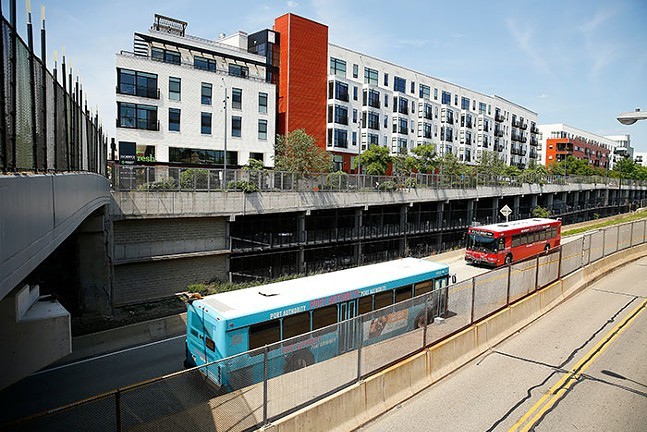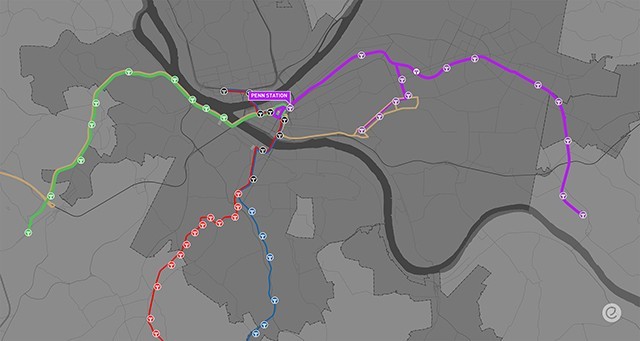
CP Photo: Jared Wickerham
The Martin Luther King Jr. East Busway in Pittsburgh's East Liberty neighborhood
The bill, if passed by the U.S. House, will be the largest investment into American infrastructure in decades. It has its critics. Some conservatives say the bill isn’t financed correctly and spends too much on nontraditional infrastructure, aka not roads and bridges. Transit advocates say the percentage given to public transit is too small, and the bill could make greenhouse gas emissions worse by incentivising driving too much and the public transit share is lower than historical allocations.
Either way, the bill is unlikely to be altered, and political leaders are confident it will pass the House. With that in mind, Pittsburgh City Paper spoke to Allegheny County Executive Rich Fitzgerald on what the bipartisan infrastructure bill could bring to the Pittsburgh region.
Busway extensions
When President Joe Biden first pitched the nation on his infrastructure bill while visiting Pittsburgh, Fitzgerald spoke to national news about the need to extend the Martin Luther King Jr. East Busway through Braddock, the Turtle Creek Valley, and into McKeesport.He reiterated those goals when speaking about what funding from the bipartisan infrastructure bill could be used on. Fitzgerald said that connecting Mon Valley towns to Pittsburgh’s large job centers in Downtown, Oakland, and East Liberty will be a large focus on the region’s infrastructure focus. He noted that Pittsburgh’s Bus Rapid Transit line — which will create bus-only lanes, bike lanes, and improved stations between Oakland and Downtown utilizing electric buses — is already paid for, and that extending the East Busway is another piece in improving Pittsburghers' public transit connectivity to large job centers.
“When you think about the busway, and the BRT, we are talking about connecting folks in the Mon Valley,” says Fitzgerald. “Those old industrial mill towns, they haven't seen the type of growth and investment that other places have. … You are connecting people to do the jobs that are here now and in the future.”
In addition to the plan to extend the East Busway to McKeesport, the Port Authority of Allegheny County is also considering a spur that would connect it to Monroeville.

Image: Courtesy of PCRG
Map of the current alignment of Pittsburgh's West Busway (in green) and East Busway (in purple)
Sewage and stormwater remediation
Fitzgerald says that one of the priorities of any infrastructure bill is spending on modernizing sewage and stormwater infrastructure at Pittsburgh Water and Sewer Authority (PWSA) and Allegheny County Sanitary Authority (ALCOSAN).ALCOSAN has a massive plan to remove billions of gallons of sewage-laced stormwater from area rivers and streams, through construction of large underground tunnels to funnel stormwater runoff over to the ALCOSAN plant in the North Side. PWSA also has been undertaking efforts to reduce stormwater runoff, and has other projects in the pipeline.
Fitzgerald says it's likely that these projects would get the go ahead if the bipartisan infrastructure bill passes.
Hazelwood-Oakland interchange
Thanks to investments, South Oakland and Hazelwood are seeing a lot of office parks and other development at the Pittsburgh Technology Center and Hazelwood Green along the Monongahela River.But currently, the I-376 interchange lacks an eastern-bound exit and western-bound entrance at Bates Street to access those developments.
Fitzgerald says the infrastructure bill could be used to widen Bates Street in Oakland, which could lead to more on and off ramps from there to I-376. He says this could help with connectivity and increase development at this emerging job center.
“So this could help open up that 170-acre development that is really heading forward,” says Fitzgerald of Hazelwood Green.
Road and bridge maintenance
The lion’s share of funds in the infrastructure bill is dedicated to roads and bridges, and Fitzgerald says the Pittsburgh area could use some maintenance in this department as well. He cites work that could be done to repair the bridge that comes before the Squirrel Hill tunnel on I-376.He says that various projects around the region are a “major expense.”
Rural broadband
Not to focus all the attention on urban and suburban infrastructure needs, Fitzgerald adds that rural parts of Allegheny County, as well as all of the surrounding counties (which are primarily rural) should be in line for funds to improve broadband connections if the infrastructure bill were to pass. He says this investment in better internet connections for rural residents is necessary to help connect them to Pittsburgh's growing economy.Green Infrastructure
Finally, Fitzgerald expects funds to go to help municipalities retrofit buildings to be more green and reduce greenhouse gases. He says the county might be able to build more green infrastructure at the county parks.Fitzgerald says he recognizes that some people will see many imperfections in the infrastructure bill, but he calls it a “great step forward.” He says that western Pennsylvania has great allies in Congress and the White House, and he expects the region will benefit from the bill.
“It certainly looks like we are gonna get some real investment in infrastructure in this,” says Fitzgerald.

